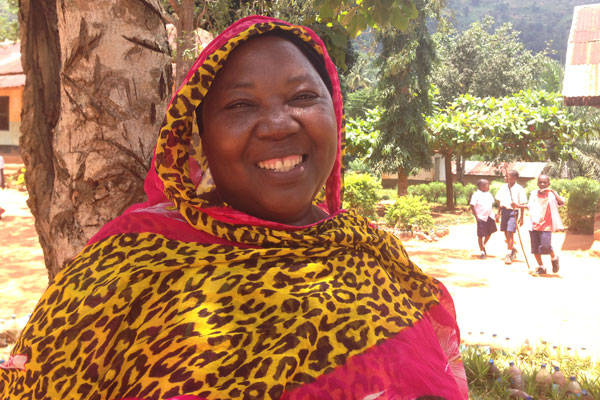Jaime Little | October 16, 2017
Sitting in the shade of the village clinic, Mwanahawa Akida Ali runs her fingers lightly along a ridge of scars on her right arm as she calculates the number of bundles of cassava stalks she expects to sell next season. Mrs. Ali is recovering from a motorcycle accident and looking forward to getting back to farming.
In December, she will plant three hectares of cassava in Masimba, in Tanzania’s Tanga region, about 300 kilometres up the coast from Dar es Salaam.
Mrs. Ali plants a disease-resistant variety of cassava called Kiroba. Farmers in the region say it produces better yields and is less vulnerable to diseases such as cassava mosaic disease and cassava brown streak disease.
As a certified cassava multiplier, Mrs. Ali not only grows enough cassava for her family to eat, but also makes money selling the sought-after planting materials. She explains: “I like being a multiplier because it’s easy to sell the cuttings compared to selling cassava as food. People buy cassava only if there is a shortage of food, but they buy stalks every planting season.”
Last season, Mrs. Ali sold 300 bundles of Kiroba stalks for use as planting materials. Her harvest of cassava roots was plentiful enough to feed her five children and enable her to sell 70 50-kilogram bags for 20,000 Tanzanian shillings (US$8.80) each. But she prefers selling stalks because she gets about twice that price.
Government extension officers encourage farmers like Mrs. Ali to produce and sell high-yielding and pest-resistant cassava varieties. Farmers are increasingly interested in trying the new varieties, which means that demand for planting materials often outstrips supply. But before shipping stalks to farmers across Tanzania, multipliers need to be sure the stalks are clean and disease-free.
For that reason, some local farmers have trained to become supervisors. A supervisor’s job is to check cassava fields regularly and help multipliers identify and eliminate diseased plants.
Charles Fredi Shaffi is a supervisor, and has 24 hectares of farmland in Bombani village, in Tanzania’s Tanga region.
Mr. Shaffi says, “There is a big difference. Before, we use to plant without considering insects and diseases. Through the training, I am now able to identify what is attacking the cassava.”
He checks the leaves for spots, curls, yellowish stripes, and signs of a viral disease locally known as vifungata. This disease is highly contagious. If the supervisors see signs of it, the farmer has to cover the plant, then uproot and burn it to prevent the disease from spreading.
Subira Mbago is an extension officer in the district that includes Masimba and Bombani. He has seen cassava diseases destroy crops and lead to malnutrition in the villages. Now he helps local farmers become seed multipliers, so they can earn income and make higher-yielding varieties available to more farmers. But, he says, this solution will only succeed if supervisors are vigilant.
Mr. Mbago explains: “If the supervision is not done well, this improved seed can be worse [than local varieties] because people come from different regions to buy planting materials. If there are certain diseases in those materials, that means the disease will spread widely.”
The extension officer adds that, once farmers have switched to the new varieties, they stop saving their own planting materials and instead buy stalks at the start of each planting season.
He says that makes farmers dependent, adding, “Many people trust this improved seed. And after trusting it, they rely on it. Once they rely on it, if there is a problem, it will spread.”
Back at the Masimba clinic, Mrs. Ali shows where her arm has healed after breaking in two places when she fell from a motorcycle taxi. Her recovery took months, and she still has medical bills to pay. But she is confident that she will be able to clear those debts with the income from selling cassava stalks.
She recalls, “When I started, people laughed at me. I spent a lot of time at my farm, and they would look at me, thinking I was wasting my time. After I succeeded, they were amazed.”
This story was prepared with the support of USAID’s New Alliance ICT Extension Challenge Fund, through the International Fund for Agricultural Development in Tanzania. For more information about the Fund, please see: https://www.ifad.org/
Photo: Charles Fredi Shaffi in his cassava field in Tanga Region, Tanzania
